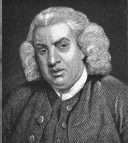The Long View Spelling Reform

Theodore Roosevelt and the Great Spelling Reform Initiative of 1906
August 27, 1906: On this date, President Theodore Roosevelt directed Charles A. Stillings, the Public Printer of the United States, to use 300 simplified spellings in all the executive-branch documents printed by his office. The documentation for this characterically bold initiative is here made available online for the first time.
The Mysterious "Executive Order"
Samuel Johnson and His Dictionary of Doom
To contrast the president's lucid and manly views with the obscurantist sophistries of the Dark Lord of Lexicography, click on the image of Dr. Samuel Johnson:

Altscript
The Altscript spelling reform proposal first burst upon the unsuspecting world in the autumn of 1997. Actually, the system is the connecting feature of two stories that I wrote about that time and posted to the Alternative History newsgroups. (You can get to the rest of my Alternative History material by clicking here.)
The Alternative History buffs (we need a name for ourselves) liked the Heinlein story well enough, and readers accepted the idea that the stories were written in the orthography of a world where English spelling reform had succeeded in the 20th century. However, if the stories sparked any great revival of popular interest in the rationalization of English spelling, I have not heard about it.
Looking at Altscript a year later, I am appalled at the number of bugs in the system. In addition, my knowledge of English phonology has increased in the meanwhile, so it now seems to me that some of my transcriptions were naive. Still, I remain convinced of the basic principle of the system, which is that a new spelling for English should be continuous with the old.
I had considered fixing the system and retranscribing the stories, but decided against it. I may someday fix Altscript, but the stories were written in the first version, and so I will keep the archived stories here. After all, they are the whole of Altscript literature so far!
A Breef History ov Altscript (Story)
The Alternativ Admirel (Robert A. Heinleins uther lyf)
Spelling Reform Schemes
If you are one of the large number of English-speakers who have been secretly tinkering with ways to reform English spelling for as long as you can remember, you may be relieved to learn that other people have been doing much the same thing.
Short Samples
Here are some examples of English text in reformed systems. The systems themselves are more or less plausible, but they do give you some idea of the range of proposals.
Truespel This text was transcribed from tradtional orthography automatically, using the Perl program. See the Links below for more information.
Fonetic This text was transcribed from tradtional orthography automatically, using the Perl program. See the Links below for more information.
Cut Spelng This text was transcribed from tradtional orthography automatically, using the Perl program. See the Links belowfor more information.
New Spelling In some ways, this is the "right" solution. The Simplified Spelling Society promoted it for several decades after the late 1940s, and not always without hope of official recognition. On the whole, though, it was probably too radical.
Particular Schemes in Detail
Altscript This is my own system. Read it and weep.
Spelriet Paul Cunningham's reform proposal.
A rashnalized spelling sistim for dhe Ingglish langwij
Simplified Spelling -or- Phonetics for Fanatics
Reformed English A new alphabet, downloadable font.
NuSpel A new alphabet.
Snapscript A more mature version of Altscript, by yours truly.
Smart Dead People & Spelling Reform
The list of smart, dead English-speakers who thought there was something wrong with the way English is traditionally spelled includes folk from Benjamin Franklin to Anthony Burgess. The list gets longer every year as more smart people die (or, as in Ambrose Bierce's case, mysteriously disappear). Not all supported radical reform, but most did. Here is just a sampling:
Richard Feynman and Issac Asimov
Mark Twain [NB: this is now attributed to someone else]
Reformed Content
There have been several major efforts since the middle of the 19th-century to reform English spelling. None has met with more than very slight success. Part of the problem, it seems to me, is that spelling reform campaigns are about, well, spelling reform. If you are interested in philology or in advancing literacy, this subject can be fascinating. For most people, though, it is as dull as dishwater.
What we have here are links to a few items I have put on the Web that some people may actually find interesting. These items use more than one reform scheme. This way, readers can compare one to another painlessly.
I will be adding more material like this in the future. What I hope for even more, however, is that other people will start to put up such material of their own.
A Breef History of Altscript
A wish-fulfillment Alternative History story in which English spelling is reformed in the 20th century.
The Alternativ Admirel
An Alternative Obituary of Robert Heinlein.
The Grait God Pan
A reformed version of Arthur Machen's novella of 1894.
List of Societies,
Persons and Resources
Promoting Spelling Reform

This is the only international conspiracy of which I am a dues paying member. The English Spelling Society has been in business, under various names (including the Simplified Spelling Society) since 1908. Based in Britain, it has an international membership of teachers, linguists and other people who are tired of spending half their working lives looking for spelling errors. There is an e-mail discussion group for members, as well as a serious scholarly journal and a newsletter. That's my proposal for a logo, by the way; it has not yet been adopted.

The American Literacy Council is the American analogue and predecessor of the Simplified Spelling Society. It supports both spelling reform and better teaching of traditional orthography. The Council offers a particularly useful spell-checker program. This program also converts traditional orthography into a reformed system, for learners who want to see how words should be pronounced.
English Spelling Reform This site by David Barnsdale has persuasive arguments for the reform English spelling and a history of the attempts to do so over the last 150 years. It also has has material supporting the thesis that the high levels of dyslexia in English-speaking countries are partly a product of the chaotic spelling system.
Institut für deutsche Sprache German, like most European languages, undergoes systematic spelling reforms from time to time. Here is a society involved in the latest, rather controversial reform.
Faster Spelling This is among many interesting notions from the Australian education reformer, Valerie Yule.
The Real Reason Spelling Reform is Impossible Justin B. Rye reveals the awful truth.
Madhukar N. Gogate & Globish A reformed orthography, from an Indian perspective, plus lots of other information about Indic lnaguages, particularly Marathi.
Romanization of Bulgarian & Re-Romanization of English English in 22 letters.
Problems in learning to read and write English A teacher's view of just how awful English spelling is.